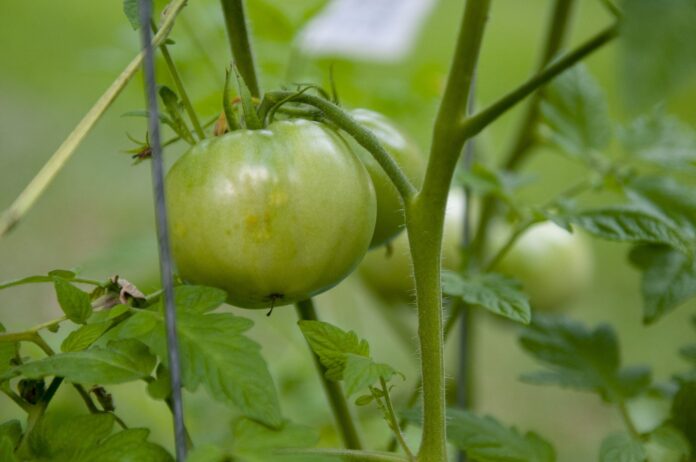AUBURN UNIVERSITY, Ala.—Tomatoes are by far the most popular plant in the vegetable garden but can also be the most problematic. Eliminate the questions and begin the official summer season with proper tomato care.
Weather, garden insects and environmental disorders–as well as viral, fungal and bacterial problems–are all challenges every gardener faces when growing backyard tomatoes. An awareness of potential problems before they arise is one way to make sure the backyard tomatoes thrive.
Alabama Cooperative Extension System Regional Home Grounds Agent Mallory Kelley said there are many things to watch for when growing tomatoes to ensure a healthy crop. As the hot and humid summer starts up, Kelley provides the following tips to keep plants healthy.
Watering and Mulch
With water, Kelley recommends starting with drip irrigation or hand watering only at the surface of the soil to avoid splashing, then prune all lower limbs off the tomatoes that are touching the soil and apply mulch.
“Mulching your tomatoes keeps the plants moisture level consistent and will help prevent blossom end rot,” she said. “Applying mulch also helps control weeds where insects like to overwinter and eliminates competition for the fertilizer you have applied.”
Mulch also creates a barrier between the plant leaves and the soil to suppress many of the fungal problems that come from the surface of the soil.
Scout for Disease and Insects
For diseases and insects, time is of the essence. Remove yellow and brown spotted leaves as soon as they appear, and if a fungicide plan is not in place, start a fungicide application to prevent early blight.
“No tomato grower can avoid this problem,” Kelley said. “It’s best to apply a preventative fungicide when the plants are healthy and there is no disease present. Products with the active ingredients chlorothalonil and mancozeb will control early blight.”
Kelley said copper is an option to control bacterial issues. It is best to scout daily for these problems, as well as insects.
“Go out and inspect for armyworms, fruit worms, hornworms and stinkbugs,” she said. “These are the main insect problems on tomatoes.”
Products that contain Bacillus thuringensis (Bt) will work when the worms are young. Gardeners can also use products containing carbaryl if the worms are larger. Another insecticide that will control stinkbugs, and some of the other pests gardeners may find, is bifenthrin.
“Don’t wait until your plant has no more leaves before you start your search for the hornworm,” Kelley said. “Scout today because the plant may not be there tomorrow.”
More Information
Learn more about growing, canning and storing tomatoes through Alabama Extension’s many regional workshops. Search “tomato” in the calendar (https://www.aces.edu/calendar/?c=&k=tomato) to find the next workshop near you.
Learn more about what may be affecting tomato plants and what you can do to help tomatoes thrive. Call the Master Gardener Helpline at 1-877-ALA-GROW (252-4769) or reach out to the local Extension office for more direction.


























